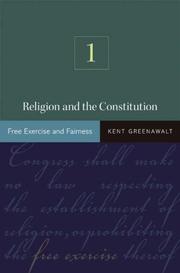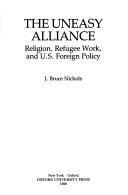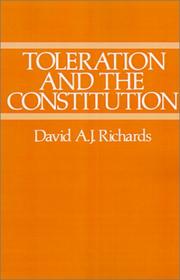| Listing 1 - 10 of 10 |
Sort by
|
Book
ISBN: 0674074114 0674072669 0674074157 9780674074118 9780674072664 Year: 2013 Publisher: Cambridge, MA
Abstract | Keywords | Export | Availability | Bookmark
 Loading...
Loading...Choose an application
- Reference Manager
- EndNote
- RefWorks (Direct export to RefWorks)
When it comes to questions of religion, legal scholars face a predicament. They often expect to resolve dilemmas according to general principles of equality, neutrality, or the separation of church and state. But such abstractions fail to do justice to the untidy welter of values at stake. Offering new views of how to understand and protect religious freedom in a democracy, The Tragedy of Religious Freedom challenges the idea that matters of law and religion should be referred to far-flung theories about the First Amendment. Examining a broad array of contemporary and more established Supreme Court rulings, Marc DeGirolami explains why conflicts implicating religious liberty are so emotionally fraught and deeply contested. Twenty-first-century realities of pluralism have outrun how scholars think about religious freedom, DeGirolami asserts. Scholars have not been candid enough about the tragic nature of the conflicts over religious liberty-the clash of opposing interests and aspirations they entail, and the limits of human reason to resolve intractable differences. The Tragedy of Religious Freedom seeks to turn our attention from abstracted, absolute values to concrete, historical realities. Social history, characterized by the struggles of lawyers engaged in the details of irreducible conflicts, represents the most promising avenue to negotiate legal conflicts over religion. In this volume, DeGirolami offers an approach to understanding religious liberty that is neither rigidly systematic nor ad hoc, but a middle path grounded in a pluralistic and historically informed perspective.
Book
ISBN: 1316354830 1316361233 1316363236 131636223X 1316364232 1139061151 131635783X 1107016509 1108448046 9781108448048 9781107016507 1316348830 9781316357835 9781139061155 Year: 2015 Publisher: Cambridge
Abstract | Keywords | Export | Availability | Bookmark
 Loading...
Loading...Choose an application
- Reference Manager
- EndNote
- RefWorks (Direct export to RefWorks)
In recent decades, religion's traditional distinctiveness under the First Amendment has been challenged by courts and scholars. As America grows more secular and as religious and nonreligious convictions are increasingly seen as interchangeable, many have questioned whether special treatment is still fair. In its recent decisions, the Supreme Court has made clear that religion will continue to be treated differently, but we lack a persuasive account of religion's uniqueness that can justify this difference. This book aims to develop such an account. Drawing on founding era thought illumined by theology, philosophy of religion, and comparative religion, it describes what is at stake in our tradition of religious freedom in a way that can be appreciated by the religious and nonreligious alike. From this account, it develops a new framework for religion clause decision making and explains the implications of this framework for current controversies regarding protections for religious conscience.
Book
ISBN: 9780674724754 0674724755 0674730135 0674730968 9780674730137 Year: 2014 Publisher: Cambridge, MA
Abstract | Keywords | Export | Availability | Bookmark
 Loading...
Loading...Choose an application
- Reference Manager
- EndNote
- RefWorks (Direct export to RefWorks)
Familiar accounts of religious freedom in the United States often tell a story of visionary founders who broke from centuries-old patterns of Christendom to establish a political arrangement committed to secular and religiously neutral government. These novel commitments were supposedly embodied in the religion clauses of the First Amendment. But this story is largely a fairytale, Steven Smith says in this incisive examination of a much-mythologized subject. The American achievement was not a rejection of Christian commitments but a retrieval of classic Christian ideals of freedom of the church and of conscience. Smith maintains that the First Amendment was intended merely to preserve the political status quo in matters of religion. America's distinctive contribution was, rather, a commitment to open contestation between secularist and providentialist understandings of the nation which evolved over the nineteenth century. In the twentieth century, far from vindicating constitutional principles, as conventional wisdom suggests, the Supreme Court imposed secular neutrality, which effectively repudiated this commitment to open contestation. Instead of upholding what was distinctively American and constitutional, these decisions subverted it. The negative consequences are visible today in the incoherence of religion clause jurisprudence and the intense culture wars in American politics.
Freedom of religion --- Church and state --- Liberté religieuse --- Eglise et Etat --- Church and state -- United States. --- Freedom of religion -- United States. --- Constitutional Law - U.S. --- United States --- American religious freedom --- Christian-Paganism --- the First Amendment --- religion

ISBN: 9780691141145 0691125821 9780691125824 1400827523 9786612721878 1282721879 0691141134 9781400827527 0691141142 Year: 2009 Publisher: Princeton, NJ
Abstract | Keywords | Export | Availability | Bookmark
 Loading...
Loading...Choose an application
- Reference Manager
- EndNote
- RefWorks (Direct export to RefWorks)
Balancing respect for religious conviction and the values of liberal democracy is a daunting challenge for judges and lawmakers, particularly when religious groups seek exemption from laws that govern others. Should members of religious sects be able to use peyote in worship? Should pacifists be forced to take part in military service when there is a draft, and should this depend on whether they are religious? How can the law address the refusal of parents to provide medical care to their children--or the refusal of doctors to perform abortions? Religion and the Constitution presents a new framework for addressing these and other controversial questions that involve competing demands of fairness, liberty, and constitutional validity. In the first of two major volumes on the intersection of constitutional and religious issues in the United States, Kent Greenawalt focuses on one of the Constitution's main clauses concerning religion: the Free Exercise Clause. Beginning with a brief account of the clause's origin and a short history of the Supreme Court's leading decisions about freedom of religion, he devotes a chapter to each of the main controversies encountered by judges and lawmakers. Sensitive to each case's context in judging whether special treatment of religious claims is justified, Greenawalt argues that the state's treatment of religion cannot be reduced to a single formula. Calling throughout for religion to be taken more seriously as a force for meaning in people's lives, Religion and the Constitution aims to accommodate the maximum expression of religious conviction that is consistent with a commitment to fairness and the public welfare.
Religious studies --- United States --- Church and state --- Freedom of religion --- Freedom of religion - United States --- Church and state - United States --- Etats-Unis --- freedom of religion --- Church and State --- law and religion --- constitution
Book
ISBN: 9781409407928 9781409407935 1409407934 1317166272 1317166264 1283318792 9786613318794 9781315572024 9781317166252 9781317166269 9781138260856 1315572028 1409407926 Year: 2011 Publisher: Farnham, Surrey, England ; Burlington, Vt. : Ashgate,
Abstract | Keywords | Export | Availability | Bookmark
 Loading...
Loading...Choose an application
- Reference Manager
- EndNote
- RefWorks (Direct export to RefWorks)
The role of religion as a contentious and motivating force in society is examined here through the lens of the church-state dynamic in countries with three very different approaches; the United Kingdom, the United States, and Germany. This book describes the components of each, illustrating their operation, examining their relative advantages and disadvantages, and delving deeply into relevant case law from all three countries in order to examine the development of their doctrines and to determine what, if anything, any of the models might learn from the others.

ISBN: 0195042743 9780195042740 Year: 1988 Publisher: New York
Abstract | Keywords | Export | Availability | Bookmark
 Loading...
Loading...Choose an application
- Reference Manager
- EndNote
- RefWorks (Direct export to RefWorks)
Sociology of religion --- Sociology of minorities --- International relations. Foreign policy --- United States --- Church work with refugees. --- Church and state --- Ecclesiastical law --- War victims --- Humanitarianism. --- Freedom of religion --- United States. --- Legal status, laws, etc. --- Foreign relations --- 1945-1989 --- Humanism --- 20th century --- Church and state - United States. --- Ecclesiastical law - United States. --- War victims - Legal status, laws, etc. --- Freedom of religion - United States. --- United States of America

ISBN: 1280524138 0198021054 0195363086 9780195363081 9780195059472 0195059476 0195059476 019504018X 9780195040180 Year: 1986 Publisher: New York Oxford University Press
Abstract | Keywords | Export | Availability | Bookmark
 Loading...
Loading...Choose an application
- Reference Manager
- EndNote
- RefWorks (Direct export to RefWorks)
Current changes in the structure of the Supreme Court, as well as recent Supreme Court decisions affecting individual rights, have today brought constitutional issues to the forefront of American thought. This study, based on an original synthesis of political theory, history, law, and a larger approach to the interpretation of culture, develops a general theory of constitutional interpretation, touching on a myriad of current topics of constitutional controversy, including church-state relations, the scope of free speech, and the application of the constitutional right to privacy, abortion, and consensual adult sexual relations.
Freedom of religion --- Freedom of speech --- Privacy, Right of --- Constitutional law --- Liberté d'expression --- --États-Unis --- --Liberté religieuse --- --Vie privée --- --Droit constitutionnel --- --Interprétation --- --Libertés publiques --- --Constitutional law --- Liberté religieuse --- Vie privée --- Droit constitutionnel --- Interprétation --- Libertés publiques --- Constitutional law - United States --- Freedom of religion - United States --- Freedom of speech - United States --- Privacy, Right of - United States --- États-Unis
Book
ISBN: 9780199737727 019973772X Year: 2011 Publisher: New York (N.Y.) Oxford University Press
Abstract | Keywords | Export | Availability | Bookmark
 Loading...
Loading...Choose an application
- Reference Manager
- EndNote
- RefWorks (Direct export to RefWorks)
Freedom of religion --- Religion and law --- Agnosticism --- Liberalism (Religion) --- AGNOSTICISM -- 322 --- USA -- 322 --- POST 9/11 ERA -- 322 --- 322 --- 261.7 --- Atheism --- Belief and doubt --- Faith --- Free thought --- Skepticism --- Godsdienstige tolerantie. Godsdienstpolitiek --- De Kerk en de burgerlijke macht: Kerk en Staat; godsdienstvrijheid; verdraagzaamheid; tolerantie:--theologische aspecten --- 261.7 De Kerk en de burgerlijke macht: Kerk en Staat; godsdienstvrijheid; verdraagzaamheid; tolerantie:--theologische aspecten --- 322 Godsdienstige tolerantie. Godsdienstpolitiek --- Freedom of religion - United States. --- Religion and law - United States. --- Agnosticism - United States. --- Liberalism (Religion) - United States.
Book
ISBN: 9781107164888 9781316616543 9781316691274 1316616541 1107164885 1316730743 1316732673 1316691276 Year: 2017 Publisher: Cambridge Cambridge University Press
Abstract | Keywords | Export | Availability | Bookmark
 Loading...
Loading...Choose an application
- Reference Manager
- EndNote
- RefWorks (Direct export to RefWorks)
While the law can create conflict between religion and health, it can also facilitate religious accommodation and protection of conscience. Finding this balance is critical to addressing the most pressing questions at the intersection of law, religion, and health in the United States: should physicians be required to disclose their religious beliefs to patients? How should we think about institutional conscience in the health care setting? How should health care providers deal with families with religious objections to withdrawing treatment? In this timely book, experts from a variety of perspectives and disciplines offer insight on these and other pressing questions, describing what the public discourse gets right and wrong, how policymakers might respond, and what potential conflicts may arise in the future. It should be read by academics, policymakers, and anyone else - patient or physician, secular or devout - interested in how US law interacts with health care and religion.
Freedom of religion --- Health care reform --- Christian ethics --- Religious health facilities --- Medicine --- Religious aspects. --- Catholic Church --- Doctrines. --- Freedom of religion - United States. --- Health care reform - United States. --- Christian ethics - United States. --- Religious health facilities - United States. --- Medicine - Religious aspects. --- Health Care Reform --- Health Workforce --- Health facilities --- Religious facilities --- Church of Rome --- Roman Catholic Church --- Katholische Kirche --- Katolyt︠s︡ʹka t︠s︡erkva --- Römisch-Katholische Kirche --- Römische Kirche --- Ecclesia Catholica --- Eglise catholique --- Eglise catholique-romaine --- Katolicheskai︠a︡ t︠s︡erkovʹ --- Chiesa cattolica --- Iglesia Católica --- Kościół Katolicki --- Katolicki Kościół --- Kościół Rzymskokatolicki --- Nihon Katorikku Kyōkai --- Katholikē Ekklēsia --- Gereja Katolik --- Kenesiyah ha-Ḳatolit --- Kanisa Katoliki --- כנסיה הקתולית --- כנסייה הקתולית --- 가톨릭교 --- 천주교
Book
ISBN: 0199986010 1283848473 0199860386 9780199860388 9781283848473 9780199950164 0199950164 9780199860395 0199860394 9780199860371 0199860378 Year: 2012 Publisher: Oxford, [England] ; New York, New York : Oxford University Press,
Abstract | Keywords | Export | Availability | Bookmark
 Loading...
Loading...Choose an application
- Reference Manager
- EndNote
- RefWorks (Direct export to RefWorks)
The First Amendment guarantee that ""Congress shall make no law respecting an establishment of religion"" rejected the millennium-old Western policy of supporting one form of Christianity in each nation and subjugating all other faiths. The exact meaning and application of this American innovation, however, has always proved elusive. Individual states found it difficult to remove traditional laws that controlled religious doctrine, liturgy, and church life, and that discriminated against unpopular religions. They found it even harder to decide more subtle legal questions that continue to divid
Church and state -- United States. --- Freedom of religion -- United States. --- United States -- Religion. --- United States. -- Constitution. -- 1st Amendment. --- Freedom of religion --- Church and state --- Religion --- Philosophy & Religion --- North & South American Religions --- 261.7 <73> --- 261.7 <73> De Kerk en de burgerlijke macht: Kerk en Staat; godsdienstvrijheid; verdraagzaamheid; tolerantie:--theologische aspecten--Verenigde Staten van Amerika. VSA. --- De Kerk en de burgerlijke macht: Kerk en Staat; godsdienstvrijheid; verdraagzaamheid; tolerantie:--theologische aspecten--Verenigde Staten van Amerika. VSA. --- De Kerk en de burgerlijke macht: Kerk en Staat; godsdienstvrijheid; verdraagzaamheid; tolerantie:--theologische aspecten--Verenigde Staten van Amerika. VSA --- United States. --- United States --- ABŞ --- ABSh --- Ameerika Ühendriigid --- America (Republic) --- Amerika Birlăshmish Shtatlary --- Amerika Birlăşmi Ştatları --- Amerika Birlăşmiş Ştatları --- Amerika ka Kelenyalen Jamanaw --- Amerika Qūrama Shtattary --- Amerika Qŭshma Shtatlari --- Amerika Qushma Shtattary --- Amerika (Republic) --- Amerikai Egyesült Államok --- Amerikanʹ Veĭtʹsėndi︠a︡vks Shtattnė --- Amerikări Pĕrleshu̇llĕ Shtatsem --- Amerikas Forenede Stater --- Amerikayi Miatsʻyal Nahangner --- Ameriketako Estatu Batuak --- Amirika Carékat --- AQSh --- Ar. ha-B. --- Arhab --- Artsot ha-Berit --- Artzois Ha'bris --- Bí-kok --- Ē.P.A. --- EE.UU. --- Egyesült Államok --- ĒPA --- Estados Unidos --- Estados Unidos da América do Norte --- Estados Unidos de América --- Estaos Xuníos --- Estaos Xuníos d'América --- Estatos Unitos --- Estatos Unitos d'America --- Estats Units d'Amèrica --- Ètats-Unis d'Amèrica --- États-Unis d'Amérique --- Fareyniḳṭe Shṭaṭn --- Feriene Steaten --- Feriene Steaten fan Amearika --- Forente stater --- FS --- Hēnomenai Politeiai Amerikēs --- Hēnōmenes Politeies tēs Amerikēs --- Hiwsisayin Amerikayi Miatsʻeal Tērutʻiwnkʻ --- Istadus Unidus --- Jungtinės Amerikos valstybės --- Mei guo --- Mei-kuo --- Meiguo --- Mî-koet --- Miatsʻyal Nahangner --- Miguk --- Na Stàitean Aonaichte --- NSA --- S.U.A. --- SAD --- Saharat ʻAmērikā --- SASht --- Severo-Amerikanskie Shtaty --- Severo-Amerikanskie Soedinennye Shtaty --- Si︠e︡vero-Amerikanskīe Soedinennye Shtaty --- Sjedinjene Američke Države --- Soedinennye Shtaty Ameriki --- Soedinennye Shtaty Severnoĭ Ameriki --- Soedinennye Shtaty Si︠e︡vernoĭ Ameriki --- Spojené obce severoamerické --- Spojené staty americké --- SShA --- Stadoù-Unanet Amerika --- Stáit Aontaithe Mheiriceá --- Stany Zjednoczone --- Stati Uniti --- Stati Uniti d'America --- Stâts Unîts --- Stâts Unîts di Americhe --- Steatyn Unnaneysit --- Steatyn Unnaneysit America --- SUA (Stati Uniti d'America) --- Sŭedineni amerikanski shtati --- Sŭedinenite shtati --- Tetã peteĩ reko Amérikagua --- U.S. --- U.S.A. --- United States of America --- Unol Daleithiau --- Unol Daleithiau America --- Unuiĝintaj Ŝtatoj de Ameriko --- US --- USA --- Usono --- Vaeinigte Staatn --- Vaeinigte Staatn vo Amerika --- Vereinigte Staaten --- Vereinigte Staaten von Amerika --- Verenigde State van Amerika --- Verenigde Staten --- VS --- VSA --- Wááshindoon Bikéyah Ałhidadiidzooígíí --- Wilāyāt al-Muttaḥidah --- Wilāyāt al-Muttaḥidah al-Amirīkīyah --- Wilāyāt al-Muttaḥidah al-Amrīkīyah --- Yhdysvallat --- Yunaeted Stet --- Yunaeted Stet blong Amerika --- ZDA --- Združene države Amerike --- Zʹi︠e︡dnani Derz︠h︡avy Ameryky --- Zjadnośone staty Ameriki --- Zluchanyi︠a︡ Shtaty Ameryki --- Zlucheni Derz︠h︡avy --- ZSA --- Η.Π.Α. --- Ηνωμένες Πολιτείες της Αμερικής --- Америка (Republic) --- Американь Вейтьсэндявкс Штаттнэ --- Америкӑри Пӗрлешӳллӗ Штатсем --- САЩ --- Съединените щати --- Злучаныя Штаты Амерыкі --- ولايات المتحدة --- ولايات المتّحدة الأمريكيّة --- ولايات المتحدة الامريكية --- 미국 --- History. --- États-Unis --- É.-U. --- ÉU
| Listing 1 - 10 of 10 |
Sort by
|

 Search
Search Feedback
Feedback About UniCat
About UniCat  Help
Help News
News